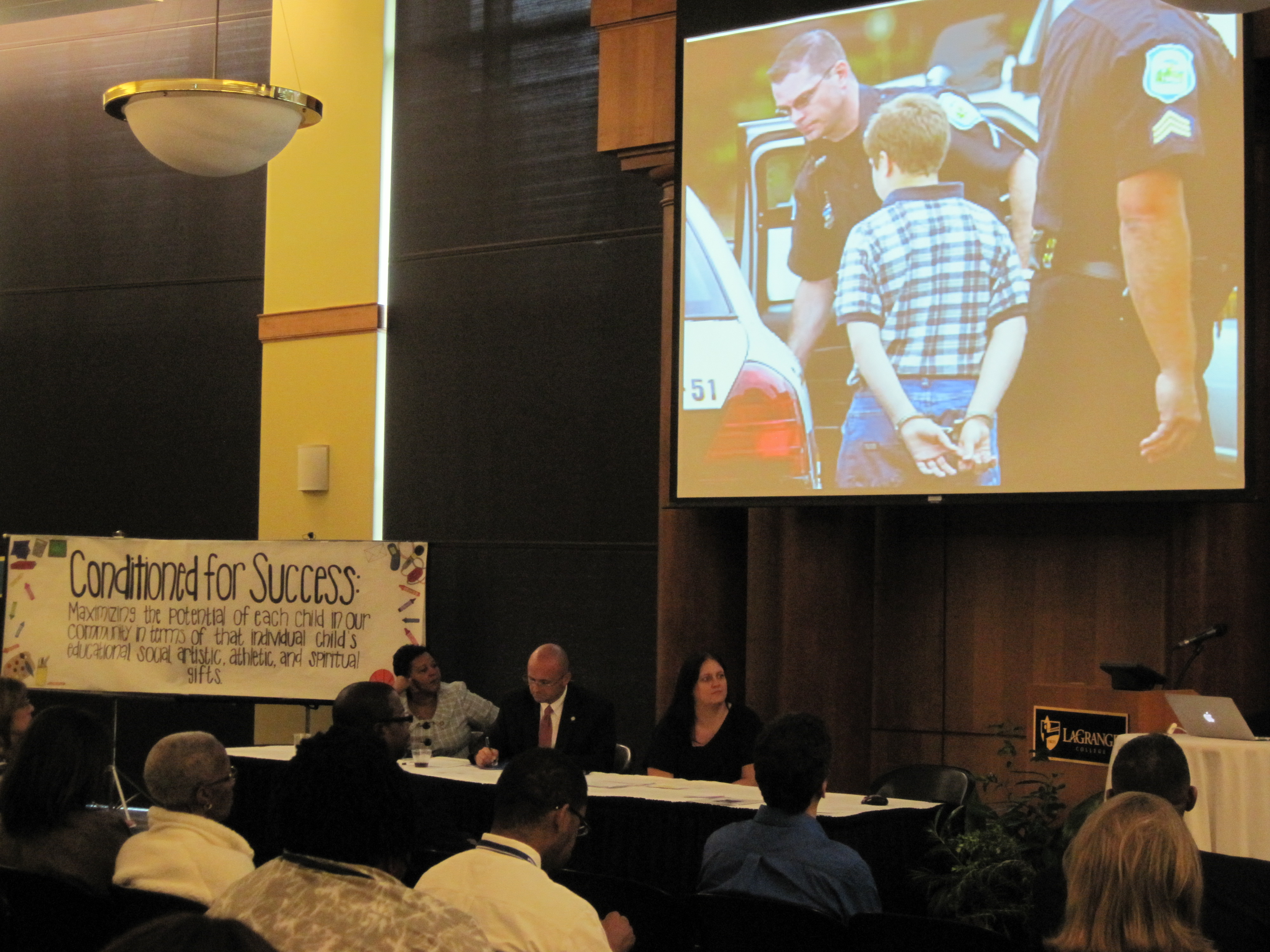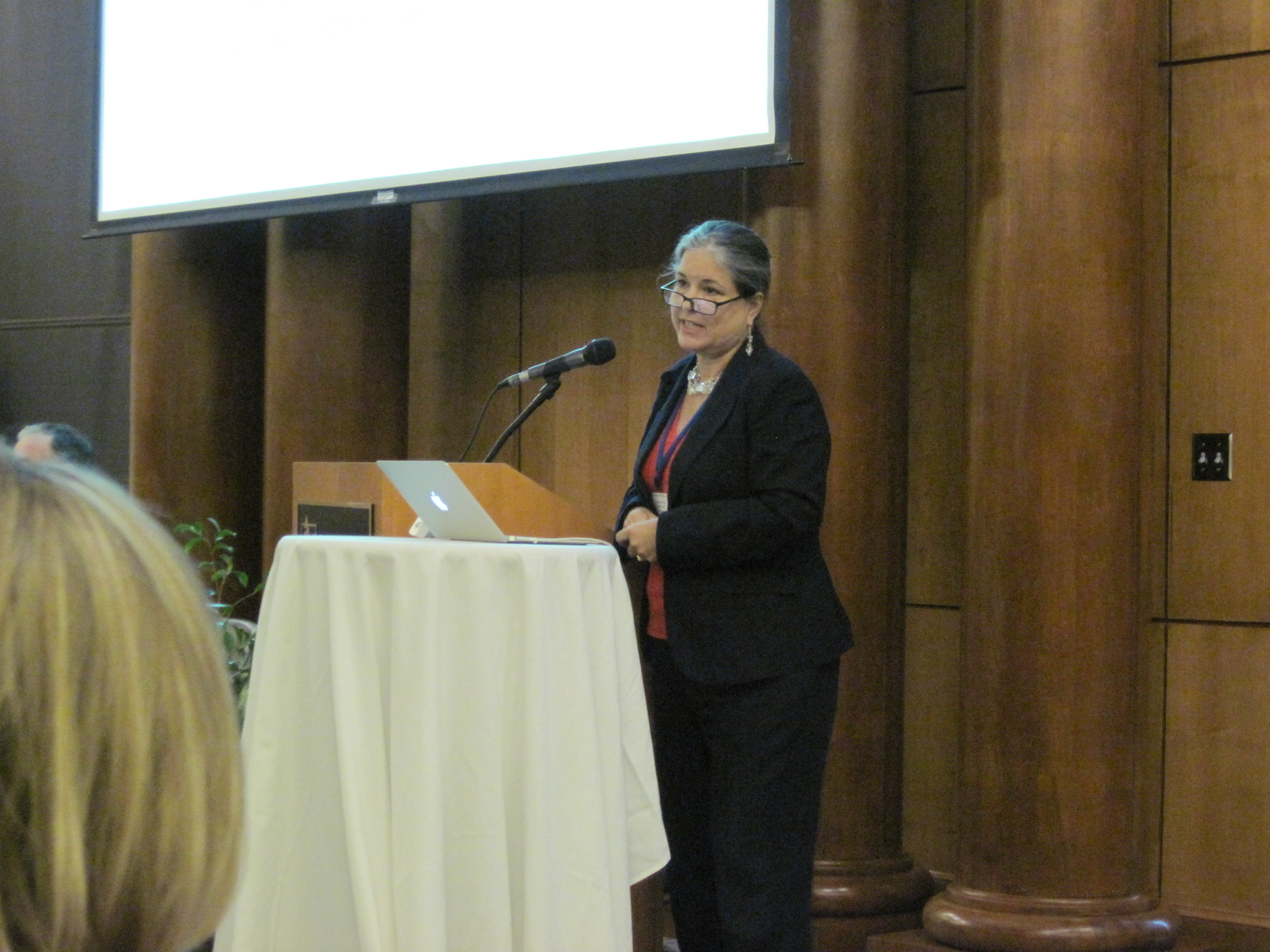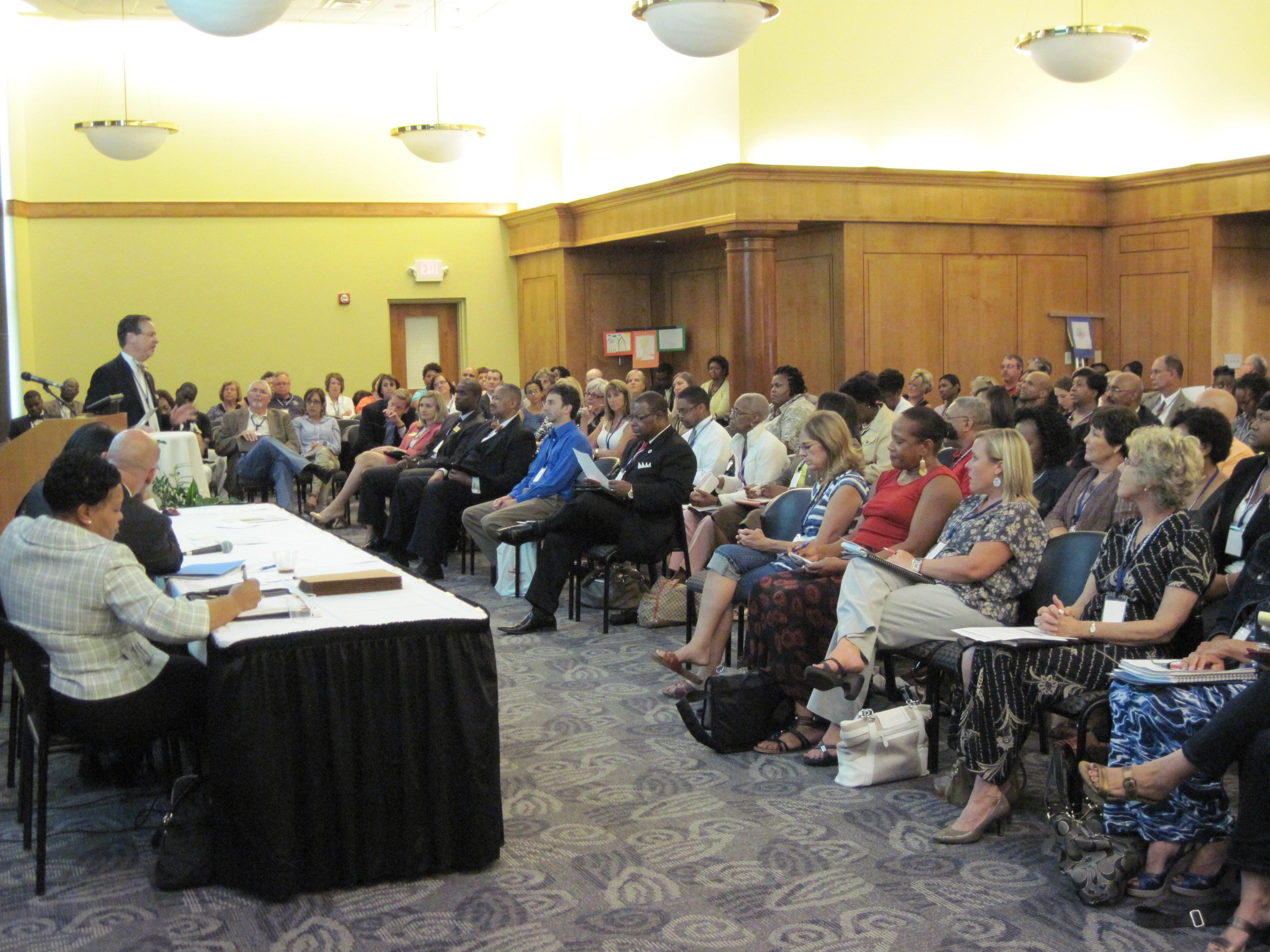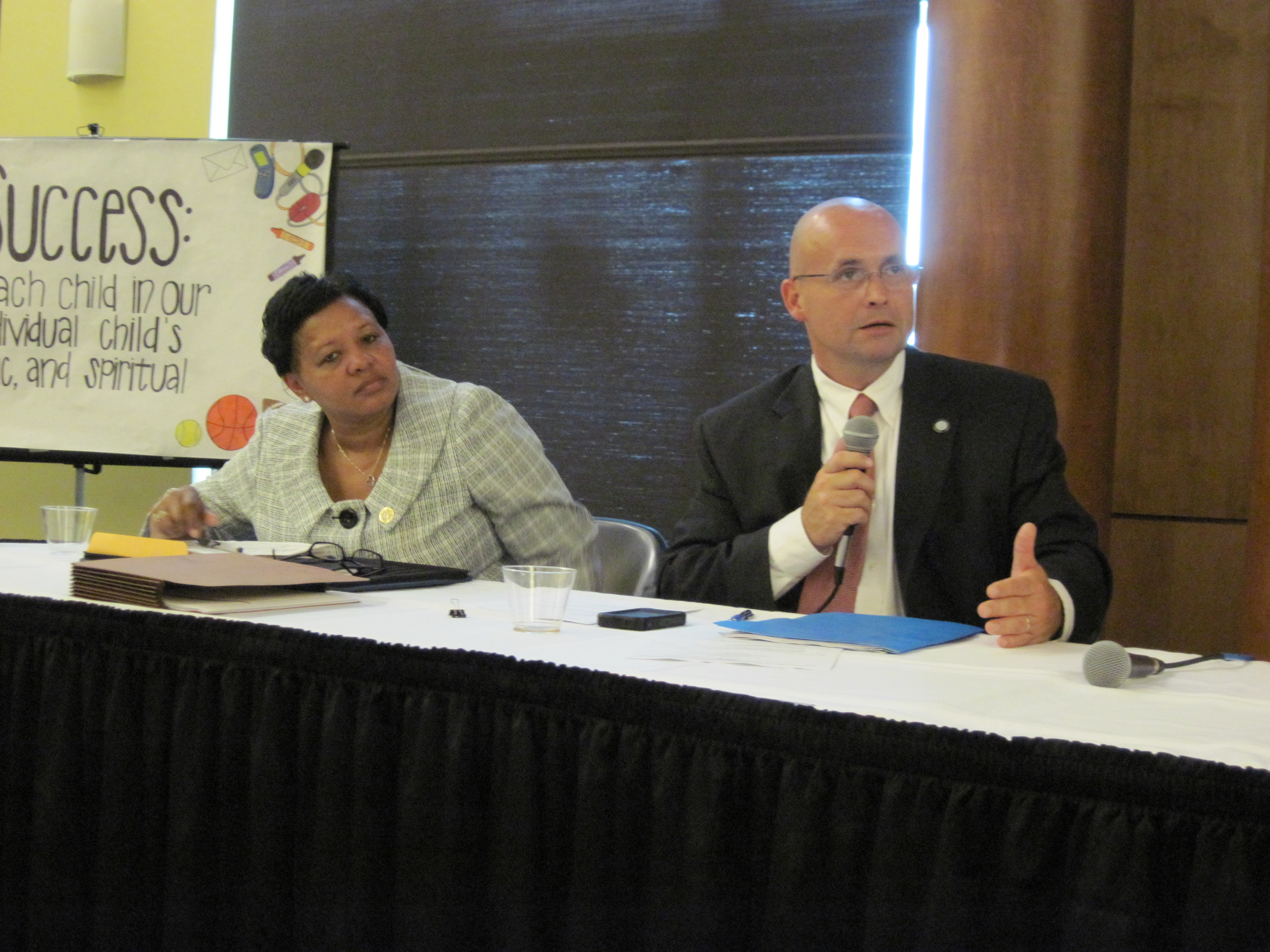“There’s a marvelous program,” said child welfare attorney Leslie Stewart.
A county-employed psychologist roams an elementary school in a neighborhood beset by poverty, gunshots, drug dealers, murder and violent crime. If the therapist sees “little Johnny getting jittery, they just use the human touch to get him reconnected to the world.”
 The therapist draws over to Johnny, lays a friendly hand on him and whispers a kind word while the class and the teacher keep on task.
The therapist draws over to Johnny, lays a friendly hand on him and whispers a kind word while the class and the teacher keep on task.
Too many of those kids don’t get fed at home, they may see crime and violence and become angry themselves. Their school day begins with breakfast and yoga.
It is based on a Baltimore, Md. school and has been implemented in a Fulton County, Ga. school that officials prefer not to name.
But it’s one of the many ideas to improve school outcomes for at-risk kids discussed at a first-of-its-kind Georgia summit on education and students involved in courts or foster care.
Kids who are in foster care or on probation are more likely than others to leave school without a diploma, and sooner or later, get mixed up with police.
In Georgia, there are federal, state and local programs to help serve at-risk youth. But not every stakeholder necessarily knows about every program or how best to coordinate them.
“We have so many separate people doing things, we just need to come together in a smooth line,” said Nicole Kostial, the lead probation/intake officer for Troup County Juvenile Courts.
She was speaking just after a facilitated group discussion with colleagues from her county who work in the school system, the Department of Family and Children Services, and others from the court.
Like teams from 22 other counties and court circuits in the state, they traded tips about what programs work for them, where to find them and what they’d like to expand. They also met the state Department of Education staff who were at the conference handing out their phone numbers.
Coordination was a sort of theme of The Summit, part of a larger Georgia project called “Conditioned for Success: Improving Educational Outcomes for Court and Agency Involved Children.” Sponsors and organizers include several foundations, and the Georgia Administrative Office of the Courts (AOC). West Georgia’s LaGrange College hosted some 420 professionals at the two-day event on June 20 and 21.
State agency bosses and other experts presented to the whole conference between breakout sessions. They laid out some of the programs from their point of view, some of which found great resonance in the audience.
In a study to be published in the coming weeks under the auspices of the AOC, Stewart researched foster kids and juvenile probationer populations in Georgia’s Polk and Troup counties. She knows that the small sample size is “statistically insignificant,” but if her numbers indicate what’s happening statewide, kids in the system are very far behind.
She’s listed several risk areas, and in each one of those, at least half of the 21 kids in her study cross into a danger zone. They’re hurt by things like missing weeks of school yearly, changing schools often, having a mental health or behavioral disorder diagnosis, or taking psychotropic medications that sometimes haven’t been approved for juveniles.
Her report will include a collaborative checklist of those items and others to be filled out by some guardian or responsible party and to be given to judges if the child appears in court. It should “make it easer for judges to tell at a glance who’s at risk,” she said.
Garry McGiboney, Associate State Superintendent for Policy at DOE used his time in front of the crowd to spread the gospel of Positive Behavior Intervention and Supports.
“PBIS works,” he said. “A lot of systems think only suspension works.” But PBIS — a system that teaches and demands respect from students, but also gives it to those who deserve it — changes a school’s whole climate and besides that costs little, he said.
 “If you go to a PBIS school, you don’t smell the bathroom at the front door,” McGiboney said, suggesting that’s the smell of a school where no one cares. But at any of the roughly 300 Georgia schools that practice PBIS, “you feel welcome as a parent … you see less bullying,” McGiboney said.
“If you go to a PBIS school, you don’t smell the bathroom at the front door,” McGiboney said, suggesting that’s the smell of a school where no one cares. But at any of the roughly 300 Georgia schools that practice PBIS, “you feel welcome as a parent … you see less bullying,” McGiboney said.
He also pled with school officials to avoid “zero tolerance” programs that channel a child straight into discipline, without taking into account mitigating circumstances. That leads to suspensions, missing school and failures. He also wants kids diverted away from courts as much as possible to keep them out of the system. For example, he said, even magistrate courts can participate, offering reckless juveniles lessons about driving, thinking and responsibility instead of tickets or even jail time.
Indeed “zero tolerance” took a beating at the summit. At one point an emcee shouted out to the crowd “What is zero tolerance?”
“Stupid!” rang out a man’s voice, provoking applause and laughter.
Georgia DOE Superintendent John Barge suggested zero tolerance actually pushes kids out of school. “Some of this zero tolerance helped schools with annual yearly progress,” he said, referring to the annual count of test scores that determine if a school is successful or not.
“If you miss ten or more consecutive days of school,” your scores no longer count for annual yearly progress (AYP) due to a counting rule that leaves out such truants.
Thus when schools feel pressured to rise in the AYP ranks, it may help to move along students who don’t score well.
“Zero tolerance in No Child Left Behind has actually left a lot of kids behind,” Barge said.
“Due to zero tolerance, we’re seeing a lot of kids brought in for nothing,” said Audrey Armistad, the acting associate superintendent of educational services for the state Department of Juvenile Justice. The DJJ runs its own separate school system.
“We think if we worked harder on relationships with schools we wouldn’t see this so much,” she admitted.
However, she also called on sentencing judges to be very specific about the educational goals assigned to juveniles in her custody. Sometimes an order requires the inmate to get a GED. Sometimes it says nothing about education, and sure enough, the children refuse to study for a GED or any of the 16 vocational programs taught in cooperation with technical colleges.
Georgia won a waiver from the federal NCLB program this year. But zero tolerance, even if it’s the culprit for pushing borderline kids into failure, is nonetheless hard to end.
It can be difficult, Barge opined, to convince the public that tough-on-crime measures are not necessarily the most just.
Photos courtesy of Maggie Lee.
























